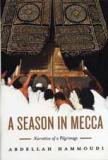Pilgrim's Progress?
Once upon a time, all Francophones were taught to write clearly and distinctly, à la Descartes; nowadays it seems they are trying their best to write obscurely, à la Michel Foucault. And Abdellah Hammoudi, a Morocco-born, Princeton anthropologist with a Ph.D. from the Sorbonne (1977), succeeds only too well in reeling off page and page of shimmering, convoluted abstractions that have only a faint link to his remarkable story, and that almost ruin it.
The premise of A Season in Mecca is fascinating: raised a devout Muslim (his very name means servant [or slave] of Allah), Hammoudi admits that his religious observance had slackened to almost nil by the time he decided to go on the hajj in 1999and take notes along the way. A sophisticated, multicultural expert on religion, profoundly respectful of, but intellectually distanced from, Islam, he would return to his personal and communal roots, and see what developed. And so he did.
The spiritual side of the hajj proved to be enthralling, but practically everything else was a disaster. Just enrolling to go (in Haouz province, a dependency of Marrakech) was a bureaucratic nightmare; and he pulled it off only with the help of bribes, connections, enormous patience and luck. Once he arrived in Saudi Arabia, Hammoudi found the Wahhabi management of the pilgrimage both dangerously incompetent and odiously bigoted. Crowd control was minimal, deaths frequent, sanitation dreadful, local travel unbearable (often creeping along at one kilometer an hour in stifling, horribly overcrowded buses), guides AWOL and commercialism rampant.
The hyper-puritanical, totalitarian Saudis continually vilified all versions of Islam but their own (blasting Moroccan permissiveness, for example), fanatically insisted on separating men and women (always stationing the women behind the men), berated and harassed the pilgrims with booming broadcast sermons. Hammoudi was lucky to escape serious injury when he got swept away amid the chaotic stoning of Satan at the pillar of Aqaba. (Slowly regaining my wits, I realized that I had lost my parasol; my ihram clothes were in shreds, my sandals were gone, and my feet were bleeding). Hammoudi’s supreme moment of revulsion was probably the overwhelming sights, sounds and smells of the two, three, four million (sic) sheep, cattle and camels awaiting sacrificial slaughter at the giant concentration camp for animals in Mina, between Mecca and Arafat. He blames this horrific scene on the Saudis as well, though it is hard to figure how it might have been ameliorated, given the oceanic throng of pilgrims, all obliged to offer at least a lamb.
In any event, Hammoudi does provide an absorbing, detailed account of a journey that non-Muslims can never take and can barely imagine. The baffling question is, exactly what did it mean to the author? He acknowledgesand forcefully describesfeelings of exaltation and terror in the presence of the sacred, of guilt and ambivalence because he cannot share his companions’ simple faith and of betrayal because he is mining the whole experience for intellectual profit. But then the Foucaultian-Lacanian hierophant takes over, and we get reams of stuff like this:
But the phenomenology of the world’s pre-reflexive configurations, of the perspectives of consciousness immanent in action and in movements of one’s own body, put me on the path to something that goes beyond these histories conceived as the simple development of initial structures or seeds. By appropriating the idea that consciousness is always already in action, in the lived world, I could not but conclude that it carried with it the unbridled mark of its own emergence.
And so?
Hammoudi presumably did not want to limit himself to the crudities of popular journalism. But he could have done the reader a favor by skipping such meta-methodological lucubrations and delving into more mundane issues, such as whether the account of the near-immolation of Ishmael in Surah 37, which plays such a crucial role in the hajj, might not have been borrowed from Genesis 22 and the archetypal Jewish-Christian episode of the binding of Isaac.
Hammoudi wrestles mightily (and obscurely) with this text right up to the end of the book. Perhaps one source of this obscurity is that he is shying away from the subversive implications of his own take on that supreme family drama. What is one to make of the figure of Hagar (Hajar in Arabic), who is brutally expelled with her child into the wilderness by Abraham and then never even consulted or informed when God inexplicably decrees the death of Ishmael (in Muslim tradition, though Surah 37 doesn’t mention his name)?
The tale has an uncomfortable patriarchal ferocity to it, and Hammoudi suggests that it could be open to new (and revolutionary?) twists. And if they came about, what might Islam evolve intosince all religions evolve? But then the hermeneutic fog, or sandstorm, descends; and we are left guessing. Hammoudi has told us a great deal about the effect of the hajj on a perceptive, cosmopolitan, fair-minded person, one with a particular sensitivity to the uses and abuses of power. What a pity he didn’t tell us more.
This article also appeared in print, under the headline “Pilgrim's Progress?,” in the March 27, 2006, issue.








